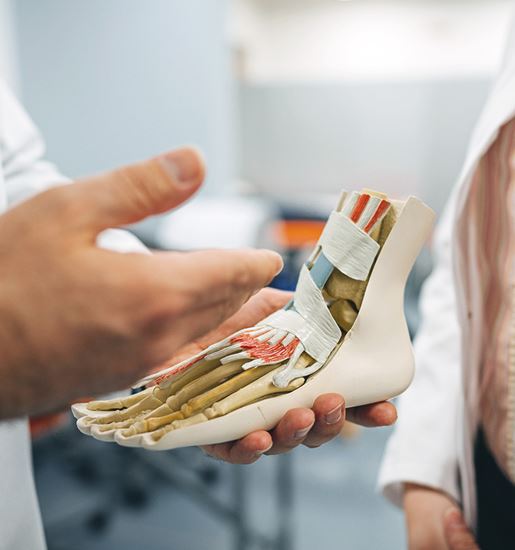Foot Orthopaedics
- Home
- Services
- Orthopaedics
- Foot Orthopaedics
Foot Conditions & Our Treatments
I have a foot condition, what are my next steps?
The foot is made up of many bones, muscles, ligaments and tendons that handle the force of your bodyweight every day. As a result, the foot is susceptible to many stresses and strains as all the different parts work together to keep you in motion. Foot problems can arise from neglect, ill-fitting shoes, wear and tear or sudden injury or disease. It can cause painful symptoms and discomfort that resulting in limited mobility.
Foot conditions can affect any part of the foot or ankle as the structure is so complex and interwoven. Foot and ankle orthopaedic specialists are highly trained in treating specific conditions that affect the whole of this area such as heel spurs, plantar fasciitis, stress fractures, bunions and arthritis. Injury or trauma through sport are common causes of foot problems, but many conditions are also exacerbated over time through poor footwear, medical conditions or a genetic predisposition.
Pain is a common symptom of most foot conditions and can vary from acute and severe, to a dull persistent ache. It is often accompanied by tenderness, numbness, tingling or visual deformity. If the foot is visibly wounded or misshapen, or your pain persists or worsens, you should seek medical help immediately. Left untreated, some foot conditions can cause complications including ongoing weakness and instability.
At St Vincent’s Private Hospitals, our specialist foot and ankle orthopaedic staff are amongst Australia’s leading and respected practitioners. We are committed to supporting patients at every step of their healthcare journey through surgical excellence, outstanding facilities and patient-centred care.

-
Step 1
GP
ReferralSee your GP about getting a referral for your specialist appointment at your nearest St Vincent’s Private Hospital.
-
Step 2
Specialist
ConsultationTalk to our world-leading specialists about the most suitable treatment options available to support your needs.
-
Step 3
Your
TreatmentExperience the streamlined care available from our team of experts as we help support you through your hospital admission, procedure and rehabilitation.
-
Step 4
Your
RecoveryOur rehabilitation team will guide you each step of the way as you regain your strength and independence.
Find an orthopaedic specialist
Find a specialist
Frequently Asked Questions
- Inflammation and swelling of the big toe that doesn’t respond to medication, rest or change of footwear
- Obvious bump on the outside of your big toe
- Toe stiffness or limited movement
- Visual deformity with toes crossing over each other
- Rubbing against other toes
- Loss of balance
Related Services

Wrist Orthopaedics
We provide specialist care and expertise for a wide range of conditions that can affect the wrist.
Read More

